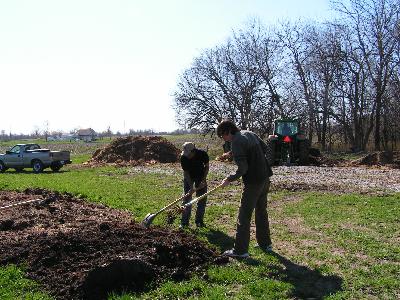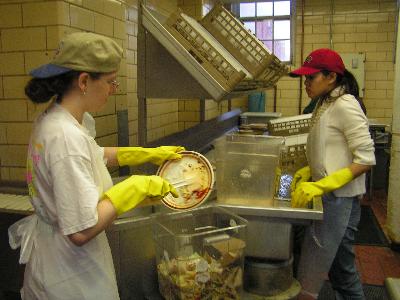University Professor Uses Composting Project to Educate and Provide Hands-On Learning Experiences

Students mix the accumulated “pre-compost” at the University Farm recently.


Students collect the wasted food in the Ryle Hall cafeteria.
Truman State University professor of biology Michael Kelrick has always been a proponent of giving college students hands-on learning experiences. Thanks to a $33,635.72 grant in 2004 from the Missouri Department of Natural Resources Solid Waste Management District, Truman students have had the opportunity to literally get their hands dirty in a pilot program to compost food waste generated in one of the University’s cafeterias.
The composting project began as an offshoot of a class taught by Kelrick that conducted environmental audits of various university practices. During the next three years, students worked with Kelrick to gather background information, coordinate with and consolidate the cooperation of relevant campus offices, demonstrate feasibility of the project, and write a grant proposal. Upon receiving the grant from the state, Kelrick and Dennis Markeson, director of Sodexho food services, launched the joint venture that helps Sodexho reduce their overhead costs for disposing of the waste and diverts materials from the solid waste stream. A concurrent goal is simply reducing the amount of food waste in the first place and creating a free source of compost for both Truman and the Kirksville communities. Working within the confines of the Ryle Hall cafeteria kitchen, composting project workers collect and measure all food wastes from the cafeteria, as well as all liquid wastes, excluding water.
The project engages two to three dozen Truman students each semester, as well as an intern. The project’s current intern, Sarah Martin, is a senior interdisciplinary studies and Spanish double major from Florissant, Mo. Martin works exclusively with the project throughout the academic year.
The first step in the composting process is the collection of all wasted food from the cafeteria. During the fall 2005 semester, student composters collected more than 10,000 pounds of food waste from the cafeteria, an average of 186 pounds per day. Nearly 500 gallons of discarded drinks (excluding water) were collected in that same semester. While the liquids are not composted, the data provides Sodexho with a sense of the costs of unconsumed beverages. The spring 2006 semester saw the project collect even more food waste, as more than seven tons of food waste were collected from the cafeteria.
The next step in the process is transporting the food waste to the University Farm, using a truck which was purchased with funds from the original grant. The waste is picked up and transported daily, to be dumped on a concrete mixing pad at the Farm. Horse stable bedding (fine wood chips and horse manure) from the Farm, as well as grass clippings, leaves or straw from the campus grounds are added to the food to increase the carbon:nitrogen ratio in the material to be composted; this promotes and favors the appropriate microbes who do the decomposition. Periodically, the accumulated “pre-compost” is mixed, using the Farm’s tractor and its front-end loader and transferred from the pad to build “the pile,” a teepee-shaped deposit roughly 10 feet in diameter and 6 to 7 feet tall. This configuration encourages the physical conditions conducive to effective decomposition and compost formation.
Throughout the process, workers continually collect data to ensure the decomposition process is running smoothly, and that the organisms responsible for the decomposition are thriving. Carbon dioxide levels within the compost are monitored, and steps are taken, if necessary, to remedy any problems that may arise in the decomposition process.
Once the compost has had time to adequately decompose, tests are run in campus labs to further monitor the process. After a period of four to five months of decomposition and curing, the compost is ready to be used by Truman to fertilize the University Farm grounds and campus gardens.
Throughout its brief history, participants in the composting project have held steady to a central goal of integrating the project within the University as a whole. For example, there have been ongoing efforts to elevate community awareness about reducing food waste and the merits of compost. Eventually, both Martin and Kelrick envision the composting project functioning in all University dining halls, while at the same time, working to “put themselves out of business” by inspiring more conscious cafeteria patrons to minimize their food wasting.
The project has taken on an even larger role this semester, with the closure of Missouri Hall for renovations. Consolidation of the University’s three major dining halls into just two this semester means the composting project now handles nearly twice as much food waste as it did in previous semesters.
According to Martin, this has not been a great burden on the project, as interest in the composting project has been very high, and the project currently has enough participants and resources to handle the extra workload, as well as to continue its mission of benefiting the environment and Truman through its composting efforts and money-saving capabilities, respectively.
The compost produced by the project has also created academic opportunities, as Truman students and faculty are using the compost for research projects and class laboratory exercises. The compost produced is free and available to both the Truman and Kirksville communities for pick-up at the University Farm.
If you are interested in learning more about Truman State University’s composting project or acquiring compost, please contact Michael Kelrick at mkelrick@truman.edu.

